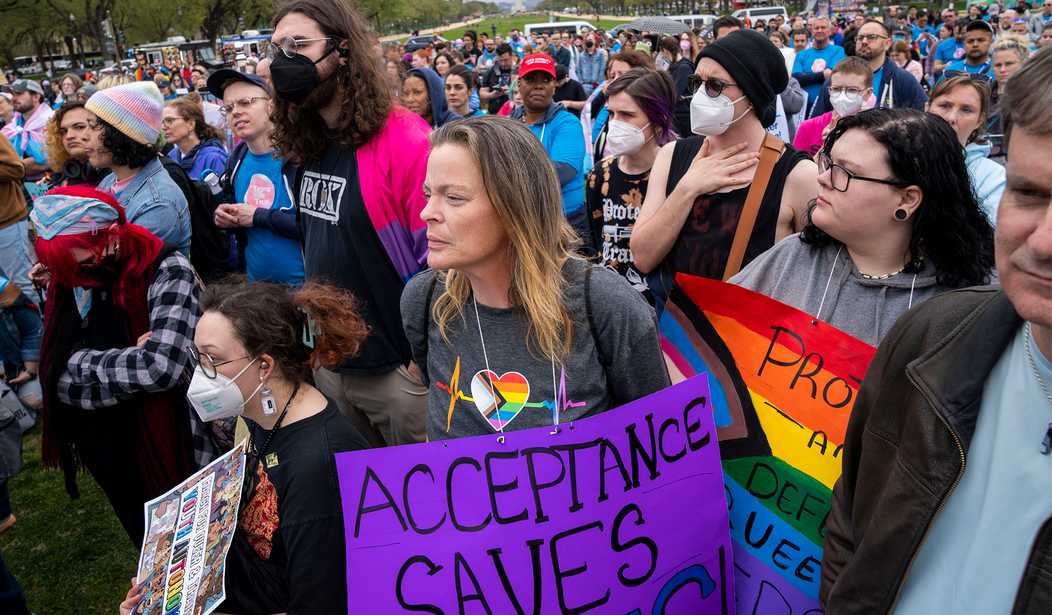No one knows how many people who undergo gender transition regret their decision to do so. The few studies on the issue vary incredibly. The AP reports that only 1% of transgendered people end up regretting transitioning. But in a 2015 survey of nearly 28,000 people conducted by the U.S.-based National Center for Transgender Equality, 8% of respondents reported detransitioning.
That’s a massive difference. And it indicates that the headlong rush to transition children of any age, fueled by trans activists and their allies on the left, needs, at the very least, to be paused while further information is gathered and research is done.
But the trans activists who have been silencing dissent to gender transition therapies in the medical community are the same activists who removed the term “Gender Identity Disorder” from the “bible” of psychiatry, the Diagnostic and Statistical Manual of Mental Disorder. Now, transgendered people are no longer afflicted or suffer from a disorder. They have “gender dysphoria”: “that is, they display a marked incongruence between their experienced/expressed gender and assigned gender.'”
This is a huge change. It means that transgender persons don’t feel well in their current identity as a man or woman, like you don’t feel well if you have a headache, but they are not disordered. But many psychologists know that this is just not true. GID does exist and deserves compassionate treatment as a mental health problem.
In fact, the biggest problem with the gender transition model is that there are numerous psychological problems that go along with gender dysphoria that are glossed over in favor of a gender dysphoria diagnosis. This is what the NHS gender clinic in Great Britain found when treating children, and it led to the resignation of nearly two dozen gender physicians.
“As demand surged for under 18-year-olds, it became clear that these young girls, in particular, had some very serious psychological problems, but were almost instantly affirmed as being ‘gender dysphoric’. That diagnosis is all that is needed to be rubber-stamped for testosterone, and subsequent surgery. Many of us that resigned over this are very worried indeed where it is leading.”
The New York Times is ignoring the whole detransitioning debate by simply claiming there aren’t enough of these regretful transgenders to justify banning children from transitioning.
But many transgender-rights activists and others warn that the outsize emphasis on a minority is distorting the policy debate
“Why are we indicting the treatment of trans youth rather than saying: What infrastructure needs to be in place to ensure that trans kids are properly evaluated?” said Dr. Madeline Deutsch, the president of the United States Professional Association for Transgender Health. “This is like saying: ‘We have unlicensed drivers on the road, so we need to basically get rid of automobiles.’”
That’s an idiotic metaphor that obscures what’s really being debated. Of course, it’s a minority who want to detransition. But at what point are the numbers large enough for us to take a step back and re-evaluate the issue of gender transitioning for kids? Is it 2%? 5%? 8%?
What adults want to do with their bodies is their own business. But children need to be protected. And that includes protecting them and their parents from quacks and charlatans in the brand new “gender transition” industry who see dollar signs when a child shows up in their waiting room.
But we can’t talk about that because the trans movement not only silences dissent. They silence debate.
After a fifth-grade student had decided she was trans, a number of her friends decided the same. The teacher didn’t want to “discourage” the children, but suspected there might be “other reasons” the friend group all expressed an interest in switching gender.
The clinic worker was happy to help, emails uncovered by the Daily Mail reveal. It didn’t matter what the teacher’s well-founded suspicions were; she should affirm the choices of all these 10- and 11-year-old children.
Furthermore, anyone who suggested that peer pressure or “contagion” might be an issue in the increase in transgender kids wasn’t “affirming” and “in my personal and professional opinion, invalid.”
People detransition for many reasons, including parental pressure and the realization that transitioning wasn’t what they thought it would be. But kids who are bombarded by transgender propaganda need to be able to make up their own minds.










